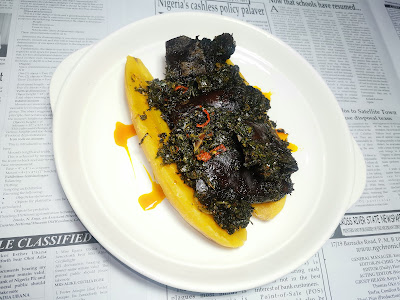Bushmeats are generally meat of game from wildlife species and due to a lot of factors including increased hunting, many of the animal species used as bushmeat are extinct or becoming extinct. Subsequently, humans have been advised to only consume animals in the wild not considered endangered and one of such animals is the grasscutter.
Grasscutters (Thryonomys swinderianus) has been a well enjoyed meat of game for decades and considered a delectable treat due to it's high nutrition profile. In the nearest future with adequate research, grasscutter should be reared domestically to meet it's ever increasing consumption demands and to boost economic returns. Due to the abundance of this animal in the dense cane-like grasses of southern Nigeria, many locals including myself have made this large rodent their "bushmeat" of choice, then something happened...
The outbreak of Ebola virus in Nigeria came with an excessive fall in the price of our choice bushmeat. Our premium bushmeat became ridiculously cheap as hunters reduced the charge for their game to attract buyers. Local restaurants whose specialty included dried grasscutter suffered poor patronage and some who could not evolve went out of business. This bushmeat resentment happened because in sensitizing the public about the Ebola virus, mainstream media advised against the eating of bushmeat as they were possible vectors of the virus.
As a child who grew up living across a bushmeat joint and later shared the same compound with one, I saw first hand the effect of this spite on our beloved grasscutter game. The usually crowded bars with a long list of orders drastically reduced and the few faithfuls called Ebola a foreign disease that would never have been in Nigeria if Patrick Sawyer never visited. Almost every evening, I would hear them arguing amongst themselves, if complete abstinence from bushmeat was a better solution to careful handling of it.
Ebola did not only affect the consumption of this rodent, it also affected common sense. At one point, a good number of the population had a salt bath and drink in the night to prevent contracting the virus😂. It was such a great relief when WHO (World Health Organization) declared Nigeria Ebola free. Soon enough, I saw people gathered at bushmeat joints to celebrate the country's victory and to appreciate the selflessness of the health officers who battled at the frontlines against the spread of this killer virus. The joy was massive, bushmeat sales and cuisines picked up, the height of celebration around me got me wondering if bushmeat had stopped being a vector of the Ebola virus.
In the months that followed, more sensitization was given in urban and rural communities: regular handwashing was emphasised; hunters and local traders were advised not to use grasscutters that were sick or found dead as they could be infected; killed games were to be roasted thoroughly and before consumption must be washed and cooked appropriately. My family was pleased with this set of advice and we went back to the dried grasscutter meals we enjoyed, adhering to the handling guidelines provided by health officers. My mum even went the extra mile of roasting the meat again before using it to cook.. typical behavior right?
One of my family's favorite delicacy was our choice bushmeat sauce. Whenever we wanted to bond as a family to share special news and crack silly jokes, bushmeat sauce was the dinner. When my dad felt like eating something different from what the rest of us were having, he'd send one of his children to buy this bushmeat sauce from the neighbor selling next door and based on good behaviour, one of us would get the golden opportunity of finishing his leftovers.
To prepare this bushmeat sauce according to my family's style, you will need:
- Cleaned dried grasscutter as bushmeat
- Seasoning cubes, salt and dry pepper
- Palm oil
- Sliced Onions
- Coarsely grounded fresh peppers
- Chopped Scent leafs
- Chopped pumpkin leafs
In a pot, season the bushmeat to your desired taste, add some water and boil until it is tender. Add in a sufficient amount of palm oil and cook for a while. You can season it a bit more if necessary then add the sliced onions, coarsely grounded fresh pepper and chopped leaves squeezing out the moisture from the leaves before adding it to the pot. Stirring gently, allow to cook for few seconds before putting off the heat.
Typically, this sauce can be made using just scent leaf but that always feels dry and requires more palm oil for it to be enjoyed. The pumpkin leaf in this recipe improves the texture of the sauce and is used in a ratio of 2:1 that is two parts of scent leaf to one part of pumpkin leaf.
Boiled plantain is the regular companion to this sauce, as a matter of fact, a particular route in my town became a tourist site because of the abundance of bushmeat and plantain joints located within that stretch of the road. You can choose whatever alternative you prefer to go with this sauce but as for me and my household, we would stick to boiled ripe plantian. ☺️



Comments
Post a Comment